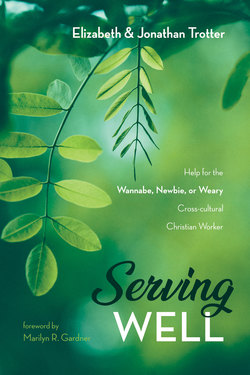Читать книгу Serving Well - Jonathan Trotter - Страница 22
На сайте Литреса книга снята с продажи.
How Do You Write Your Name in the Land?
Оглавлениеby Elizabeth
The streets of Phnom Penh, Cambodia are littered with garbage. The garbage stinks, and the open sewers reek. The construction on my street can be deafening, and I sometimes tire of all these sights, sounds, and smells.
But in the middle of this assault on my (admittedly sensitive) senses, I catch a glimpse of perfection: palm trees, right in the middle of the city. Green and graceful, the most beautiful trees in the world.
Often, at the end of a long and draining day, all I can manage is to shovel a spoonful of hummus into my mouth and plop myself down on the corner of the couch that has the best view of the palm trees across the street. What happens inside my soul is beyond words.
Even better than my living room view is the view from my roof. It’s a little slice of heaven, especially as the clouds roll in, the winds blow, and the afternoon rains start falling. The air is delicious up there, and the palm and banana trees are larger and leafier on that side of the house. And even though I’m so familiar with them by now, some days I just can’t tear my eyes away.
So why do I share my love affair with palm trees? Well, because, in a very real way, palm trees sustain me. There is a power in their beauty that lifts my spirit, calms my anxiety, and releases me from the stress of all the rotting streets and invasive noises. What would I do without my daily dose of palm trees? They’re a green paradise in an otherwise concrete jungle, and when I look at them, I stand in awe of my Creator.
They are how I write my name in the land. The idea of “writing your name in the land” comes from the movie Skylark, one of my favorite American pioneer movies. Skylark is the sequel to Sarah, Plain and Tall, another favorite of mine. (I have a lot of favorite pioneer movies.)
Sarah, Plain and Tall tells the story of a woman from Maine who moves to Kansas as a mail-order bride for Jacob, a widower with two children. Jacob and Sarah fall in love, and by the beginning of the movie Skylark, they’ve been married for a couple years.
The people of Kansas are now facing a drought. The prairie dries up a little more each day, and it has truly become a “dry and thirsty land.” But Sarah comes from a place by the sea—a cool, wet place where drought is unknown—and she’s never experienced a season like this before.
When the wells run dry, the people of the community travel to the river, hoping to find water there, but the river is nearly dry. In desperation, Sarah’s closest friend Maggie, and her husband Matthew, tell Jacob and Sarah that they are considering leaving the prairie and settling somewhere else. Sarah is so frustrated by this possibility that she blurts out:
“I hate this land. No, I mean it. I don’t have to love it like Jacob, like Matthew. They give it everything, everything, and it betrays them. It gives them nothing back. You know, Jacob once told me his name is written in this land. Well, mine isn’t. It isn’t.”13
Maggie replies in a thick Scandinavian accent:
“You don’t have to love this land. But if you don’t, you won’t survive. Jacob, is right. You have to write your name in it to live here.”
Maggie winces at the severity of her own words, and Sarah walks away, not yet able to accept this truth. By the end of the film, though, we watch her take a stick, bend down, and literally write her name in the dust of the land. Her heart has taken up residence in a place that is both overwhelmingly good and harsh. And she has planted herself in it.
I still cry when I watch those scenes. Do I love the strange land I find myself in? Have I scrawled my name in it? I still get annoyed by daily life. I still struggle to understand many of the East/West cultural differences. I still get discouraged by the sin problems inherent in an exceedingly corrupt society.
But I love this land.
I love the rice fields in the rain, verdant and green. I love the banana trees, oversized and leafy. I love the palm trees too numerous to count—a sight that never grows old. I love the clouds, large and billowing, and the sunsets, pink and orange.
So what sustains you in your host country? How do you plant yourself in the place God has called you to serve? When the earth under your feet seems to crack, when your life is dry and scorched, what do you hold on to? When the soil starts to disintegrate and your well dries up, where do you go?
When no rain falls, when the crops wither away, and there’s no harvest, what do you do? What is your anchor, and where are your roots? Where have you put your signature?
How do you write your name in the land?
13. Sargent, Skylark.
